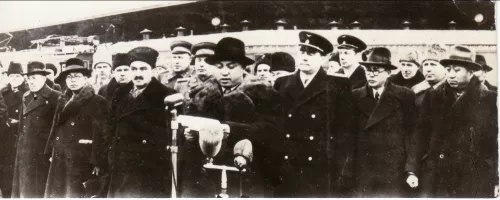Kim Il Sung during a visit to Moscow, March 1949.
National Archives and Records Administration, Record Group 242, Shipping Advice 2011, Item 6/26. Contributed by Charles Kraus.

This collection of primary source documents sheds light on the question of "who started the Korean War?" For more coverage of the Korean War on the Digital Archive, see the collections: Korean War, 1950-1953; Korean War Armistice; China and the Korean War; and Korean War Biological Warfare Allegations. For a collections resource guide see The Korean War: Collections & Resources on DigitalArchive.org.
